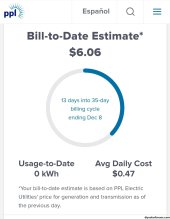ksmithaz1
Solar / EV Junkie
Florida? is a a really mixed state, and still has a lot of very poor rural areas and a very aged population. In most places, part of that $32/$whatever helps to pay for people in the state that cannot afford it. This would be true almost across the board with most state regulated service. Now personally I'd let them do without, but the better angels of society deem this worthy, and frankly I'm not going to get too excited about it, as the alternative might actually create more issues than it solves. YMMV. Further, Florida power infrastructure has a tendency to take a real beating from time to time.Around $32 total out of pocket which is equivalent to 200 kWh per month for "free" use it or lose it. I am OK with it but they better not raise it.
Here in Phoenix they've (APS,SRP) managed to move a large chunk of the power distribution underground. It's expensive, but the folks here have repeatedly voiced and voted for it, even with the rate and fee increases. I think it's much better and really improves grid reliability, but you gotta pay for it. Anything new here goes underground.



